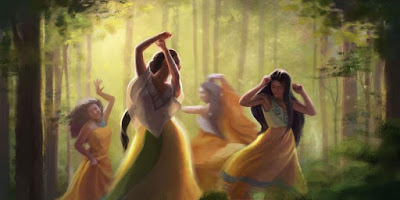In the above chart, you can see that the Nephites were spread out as the fled before the Lamanites. As you look at that oval, where do you think the most vulnerable people would be? Most likely, they would have been at the back of the bunch, closest to the enemy. A leader like Captain Moroni would have placed some of his strongest men in the back as a rear guard to protect the elderly and ill, small children and their mothers. Where do you think King Noah would have placed himself and the strongest men? I would guess that they were out if front, running the fastest they could. I make this hypothesis based on the fact that, when Noah could see that the Lamanites were gaining ground, he counseled his priests and other strong men to leave their wives and children behind to fend for themselves, while they ran unencumbered. As a result, the Lamanites captured this most vulnerable group quickly. Some of the men had ignored Noah and stayed with their families. Later, when the adrenalin wore off, most of the men who ran away felt ashamed of themselves and chose to return to their families. Apparently Noah's son, Limhi was among this bunch. The king and his false priests continued on, probably in fear of what the other Nephites would do to them even if the Lamanites didn't kill them.
Of course, we know the rest of the story of Noah and the priests. Noah had been put to death, probably by the group that returned to their families, and his priests continued in their flight. They came upon the Lamanite daughters dancing and captured many of them to be wives to this priests.
But - and this is not something I'd thought about until today - what of the wives and children they already had? The ones who had been left behind? What happened to them? The only logical thing to suppose is that they were among the people who remained and were governed by Noah's son, Limhi. When Limhi's people escaped after 24 years in bondage, those children of the priests would have gone with the group to Zarahemla. Once there, they joined the people of Alma and the Nephites and Mulekites already living there.
King Mosiah called a conference to unite his people
King Mosiah convened a great conference of all the people. One of the items on the agenda was to read aloud the records that Limhi kept. They also read aloud the records kept by Alma and his people.
These two groups had been gone from Zarahemla for 80 years, but there were those living among them who had families in Zarahemla who had mourned them. (Remember when Amaliki wrote that his brother was among those who left and he never knew what happened to him? - See Omni 1: 30)
What happened next? I'll refer to the text:
And now when Mosiah had made an end of reading the records, his people who had tarried in the land were struck with wonder and amazement. For they knew not what to think. … And it came to pass that those who were the children of Amulon and his brethren [the priests of Noah] were displeased with the conduct of their fathers, and they would no longer be called by the names of their fathers, therefore they took upon themselves the name of Nephi, that they might be called the children of Nephi and be numbered among those who were called Nephites. (Mosiah 25: 12)
What's in a name? Shakespeare didn't think much when he said, "A rose by any other name would smell as sweet." That may have been the case in Mr. Shakespeare's day, but in the Semitic cultures of the Middle East and in Mesoamerica, a name meant a lot. The name of Nephi was an honored name. These people were ashamed of their father and grandfathers and no longer wanted that familial association. In taking the name of Nephi, they showed respect for Nephi himself as well as for the righteous ideals he held and taught to his children.*
I am grateful that I bear an honorable family name and can look upon my own father and mother with great love and respect. But I, along with my parents, have taken upon myself another name - that of Jesus Christ. I never want shame brought to His name because of things I do. I have had sore need to repent whenever I have forgotten that.
© May 2020 Dr. Kathleen Rawlings
Buntin Danielson
* The people having loved Nephi exceedingly, he having been a great protector for them, having wielded the sword of Laban in their defense, and having labored in all his days for their welfare—Wherefore, the people were desirous to retain in remembrance his name. And whoso should reign in his stead were called by the people, second Nephi, third Nephi, and so forth, according to the reigns of the kings; and thus they were called by the people, let them be of whatever name they would. (Jacob 1: 10 - 11)
A bit of an FYI - My sister once asked me what it was like living in my brain? If you read my blog, you can learn a lot about how my thoughts connect disparate pieces of information. Today, for example, I read one verse of scripture that intrigued me enough that it sent me on the trail of an important concept I would never have otherwise researched. I have found that, for me, studying the scriptures thematically helps me understand them better.






No comments:
Post a Comment